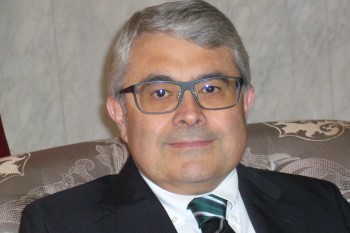Events

September 2016
H. E. Mr. Ahmet Bulent Meriç, Ambassador of the Republic of Turkey
UPDATE: Mar 17, 2017
Inviting Japanese Private Sector to Look at Turkey in 20 Years’ Time
—– The recent official bilateral visits by the leaders created a new momentum for furthering the friendship between Japan and Turkey.
It has been 125 years since the disaster of the Turkish frigate Ertuğrul when the strong friendship between Turkey and Japan began. The relationship has improved further by the leaders’ reciprocal visits, twice within the last 3 years. Turkey and Japan regard each other as an important partner in their respective regions. Therefore, the relationship has turned into pivotal strategic partnership, which is the ultimate level in international relations. In this context, the countries cooperate intensively especially in the economic and technological fields.
—– What is your priority mission for furthering the relationship?
My primary role as an ambassador is to expand the friendship and pass it on to the new generation. It is also to draw attention of the Japanese government as well as the private sector on Turkey’s middle and long term vision. Turkey has set its “2023 Vision” to become an economic and industrial hub in its region. We surmise that, by 2023, our population will be about 84 million people, so we aim to increase our GDP to 2 trillion dollars and the per capita to 25 thousand dollars. Our location bridges Europe, Middle East, and Central Asia; and the infrastructure must be improved for better connectivity. We invite the Japanese corporations to look at Turkey in 20 years’ time and participate in our projects such as highways, ports, airports, bridges, nuclear power projects, and renewable energy projects.
—– Japanese companies are more actively investing in Turkey. What do you expect from the Japan-Turkey Economic Partnership Agreement (EPA) under negotiation?
The goal in our trade with Japan is to expand Turkey’s exports and balance our trade account. At present there are 204 Japanese companies in Turkey; and most of the direct investment of 1.8 billion dollars was made in the last 6 years. We hope the Japan-Turkey EPA will expand the bilateral trade and investment and expect that both the Japan-EU and Japan-Turkey EPAs will be signed simultaneously within this year.
—– The role of Turkey is becoming more important in the Middle East. How does Turkey pursue the “zero problems” foreign policy?
Turkey supported “Arab’s Spring” with a hope that it would bring democracy and peace in the region. Thereby, countries of the Middle East could have come together to form a sort of economic togetherness, along the lines of the EU in Europe. Unfortunately this did not materialize. Instead, we now face a humanitarian catastrophe in Syria, because of a proxy war. As a beacon of democracy, Turkey cooperates with all the concerned actors to stabilize the region and to see peaceful neighbors.
—– Turkey and the EU have agreed to a plan to ease the migration crisis. How will the plan be implemented?
Turkey has accepted a total of 3 million asylum seekers, 2.5 million from Syria andwe have reached our limit, spending around 13 billion dollars. Many asylum seekers also passed through Turkey to Europe. The EU then approached Turkey and Turkey agreed to a deal , the deal that illegal migrants to Greece would be returnedto Turkey and in return the EU would accept the same number of Syrian asylum seekers in Turkey. The deal was based on three conditions: 1) accelerating the prolonged negotiations of Turkey’s accession to the EU, 2) removal of the visa requirements for Turkish citizens, 3) EU’s financial support for asylum seekers in Turkey. However, this deal didn’t work, because the EU demanded extra requirements for the fulfillment of the said conditions.